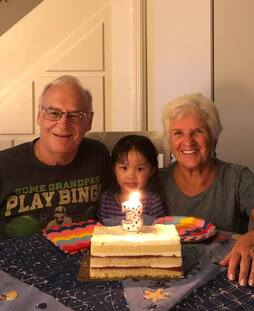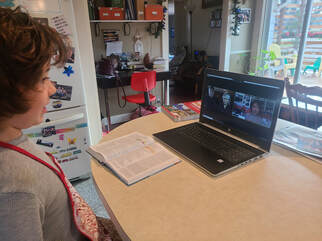February: elders/cloud of witnesses

When I (Talashia) was a child, my family lived far away from our extended family. My parents felt that relationships with elders were an important part of my faith development, so they intentionally surrounded our family with elders from our community. We had adopted grandparents, an older friend who was our fifth family member, mentors, and older adults who were important parts of our lives. Those relationships were formational, even transformational. You are probably reading this and thinking of your own stories of adults (relatives or nonrelatives) who were important to your own development.
This concept of being surrounded by elders is not often explicitly described in the Bible - because it was simply how society was set up. According to The Jewish Annotated New Testament, a household usually consisted of several generations. While these generations were usually all related to one another, sometimes they were not. Children were highly valued in Jewish culture, evidenced when people bring their children to Jesus. Children growing up surrounded by elders in the faith is simply assumed in the biblical story (Kraemer, 605).
This month’s scripture is a lovely one. While the cloud of witnesses referred to here is really referring to the ancestors of the faith that have been described in the previous chapter, it can also be a way for us to think about being surrounded by elders. What we translate as “cloud” would have, in Roman culture, meant “crowd.” A crowd of witnesses gives us the strength and resources to live this life of faith.
This concept of being surrounded by elders is not often explicitly described in the Bible - because it was simply how society was set up. According to The Jewish Annotated New Testament, a household usually consisted of several generations. While these generations were usually all related to one another, sometimes they were not. Children were highly valued in Jewish culture, evidenced when people bring their children to Jesus. Children growing up surrounded by elders in the faith is simply assumed in the biblical story (Kraemer, 605).
This month’s scripture is a lovely one. While the cloud of witnesses referred to here is really referring to the ancestors of the faith that have been described in the previous chapter, it can also be a way for us to think about being surrounded by elders. What we translate as “cloud” would have, in Roman culture, meant “crowd.” A crowd of witnesses gives us the strength and resources to live this life of faith.
Read It
Hebrews 12:1-3 "since we are surrounded by such a great cloud of witnesses...."
Pray It
God, you created us to live in community. By design, we need people. Thank you for the elders in our lives, the crowd of witnesses you have surrounded us with. Help us grow in these relationships. Amen.
God, you created us to live in community. By design, we need people. Thank you for the elders in our lives, the crowd of witnesses you have surrounded us with. Help us grow in these relationships. Amen.

Do It Who is - or can be - an important elder in your child's life?
Do an elder inventory. We’re loosely defining “elder” here - not as people of a certain age, but as people who can be guides, mentors and companions in faith. While this could be an activity for just parents, especially with very young children, it is also interesting to get a child’s input - they may identify elders you wouldn’t think of.
-Who are the elders in your family’s life?
-Take note of gender and cultural ethnicity. How diverse are your elders?
-Take note of age. Do you have elders at multiple stages of life?
-Do you have family elders as well as individual elders? In other words, are there people who relate with your whole family, as well as people who relate with individuals?
-Do you have any elders you aren’t related to?
After you’ve done your inventory, identify the gaps. Prayerfully consider asking people to be part of your crowd of witnesses. If just saying, “Will you be an elder for our family?” feels strange, here are some specific ways to ask people to be part of your life:
-Adopted family (aunts, uncles, grandparents…)
-Mentor (for a specific person in your family, or even a family at a different stage of life, like with teenagers, that you ask to be your family mentor)
-Buddy: If you notice one child doesn’t have enough adults to relate with, maybe you ask someone to be their buddy - or “grownup friend,” as our son called it when he was young. Maybe it’s someone who does something specific with the child, like a baking buddy or a building buddy.
*Note: Cultivating relationships looks very different during pandemic times. You will need to get creative with making these connections! Outdoor bonfires, virtual dinner parties, doing a project over Zoom, and being penpals are just a few examples of what we’re seeing people do right now to continue to grow in these relationships.
Do an elder inventory. We’re loosely defining “elder” here - not as people of a certain age, but as people who can be guides, mentors and companions in faith. While this could be an activity for just parents, especially with very young children, it is also interesting to get a child’s input - they may identify elders you wouldn’t think of.
-Who are the elders in your family’s life?
-Take note of gender and cultural ethnicity. How diverse are your elders?
-Take note of age. Do you have elders at multiple stages of life?
-Do you have family elders as well as individual elders? In other words, are there people who relate with your whole family, as well as people who relate with individuals?
-Do you have any elders you aren’t related to?
After you’ve done your inventory, identify the gaps. Prayerfully consider asking people to be part of your crowd of witnesses. If just saying, “Will you be an elder for our family?” feels strange, here are some specific ways to ask people to be part of your life:
-Adopted family (aunts, uncles, grandparents…)
-Mentor (for a specific person in your family, or even a family at a different stage of life, like with teenagers, that you ask to be your family mentor)
-Buddy: If you notice one child doesn’t have enough adults to relate with, maybe you ask someone to be their buddy - or “grownup friend,” as our son called it when he was young. Maybe it’s someone who does something specific with the child, like a baking buddy or a building buddy.
*Note: Cultivating relationships looks very different during pandemic times. You will need to get creative with making these connections! Outdoor bonfires, virtual dinner parties, doing a project over Zoom, and being penpals are just a few examples of what we’re seeing people do right now to continue to grow in these relationships.
Explore it: A Note from Tami
These elder friends were so valuable for both my children and me. I remember “Grandma Luetta” soothing my colicky baby when I was too exhausted and tense to do so. And my child responding well to “Aunt Evelyn’s” words of wisdom when those same words were not as openly accepted from me. And that sense of community, knowing that I was not in this nurturing role by myself. Reaching out to someone to be an elder may take courage and effort, but it is SO worth it! Persons usually feel honored to be asked. The relationship is a blessing for them, too.
* Magic happens when grandparents care for grandchildren
Some ways grandparents (or other elders) can have unique connections with young children that foster them to learn and grow
* Young and old together: Why kids and the elderly benefit from close relationships
* What happens when old and young connect
These elder friends were so valuable for both my children and me. I remember “Grandma Luetta” soothing my colicky baby when I was too exhausted and tense to do so. And my child responding well to “Aunt Evelyn’s” words of wisdom when those same words were not as openly accepted from me. And that sense of community, knowing that I was not in this nurturing role by myself. Reaching out to someone to be an elder may take courage and effort, but it is SO worth it! Persons usually feel honored to be asked. The relationship is a blessing for them, too.
* Magic happens when grandparents care for grandchildren
Some ways grandparents (or other elders) can have unique connections with young children that foster them to learn and grow
* Young and old together: Why kids and the elderly benefit from close relationships
* What happens when old and young connect
